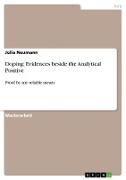- Start
- Doping: Evidences beside the Analytical Positive
Doping: Evidences beside the Analytical Positive
Angebote / Angebote:
Masterarbeit aus dem Jahr 2010 im Fachbereich Jura - Sonstiges, Note: B, University of Auckland, Sprache: Deutsch, Abstract: Unfortunately, sport nowadays does not always meet the idealized image of a clean competition. In too many cases, illegal performance enhancement, so called "doping", plays a dominant role in sports. This development might derive from the circumstance that sport is rather a business than an individual endeavour and self-realisation. Enormous amounts of money are involved in hosting events and marketing of athletes. However, increased doping actions may also result from the development and availability of various technical possibilities for performance enhancement.
In the rather widespread field of doping, this paper focuses on the specific area of evidences on doping rule violations other than by so called "analytical positives". This paper concentrates on circumstantial, non-analytical and evidence by longitude profiling. Concluding from the number of decisions, these forms of evidence play an important role in the conviction of doping infractions.
Circumstantial evidences, for example, inhabit crucial importance in cases where an analytical sample is not available. This refers to cases where, for instance, a doping offence is detected some time later and to cases where, with present laboratory techniques, the use of a substance or method in general is hard/ impossible to detect. Especially in the latter case, methods like longitude profiling of blood/urine may be more widely used in the long term.
However, in non-analytical cases, authorities have to face the challenge that the principle of strict liability is not applicable, as in cases where the use of a prohibited substance is proven by the positive result of analytical laboratory tests. In this circumstance, strict liability means that the proof of knowledge or intent to use the substance is redundant. Furthermore, questions arise when the burden of proof is fulfilled in case of a doping allegation, and when non-analytical and/or circumstantial evidences amount to a conviction. Partially, the referring answer is dependent on the distinction between the system of criminal law and classification of disciplinary rules as part of public law.
This paper will deal with these issues raised above standing. It will furthermore provide a critical analysis of selected decisions made by the International Court of Arbitration for Sport based on these special types of evidence. The paper, finally, will summarize difficulties and inconsistencies throughout the decisions, but also confirmations and similarities.
Folgt in ca. 10 Arbeitstagen

